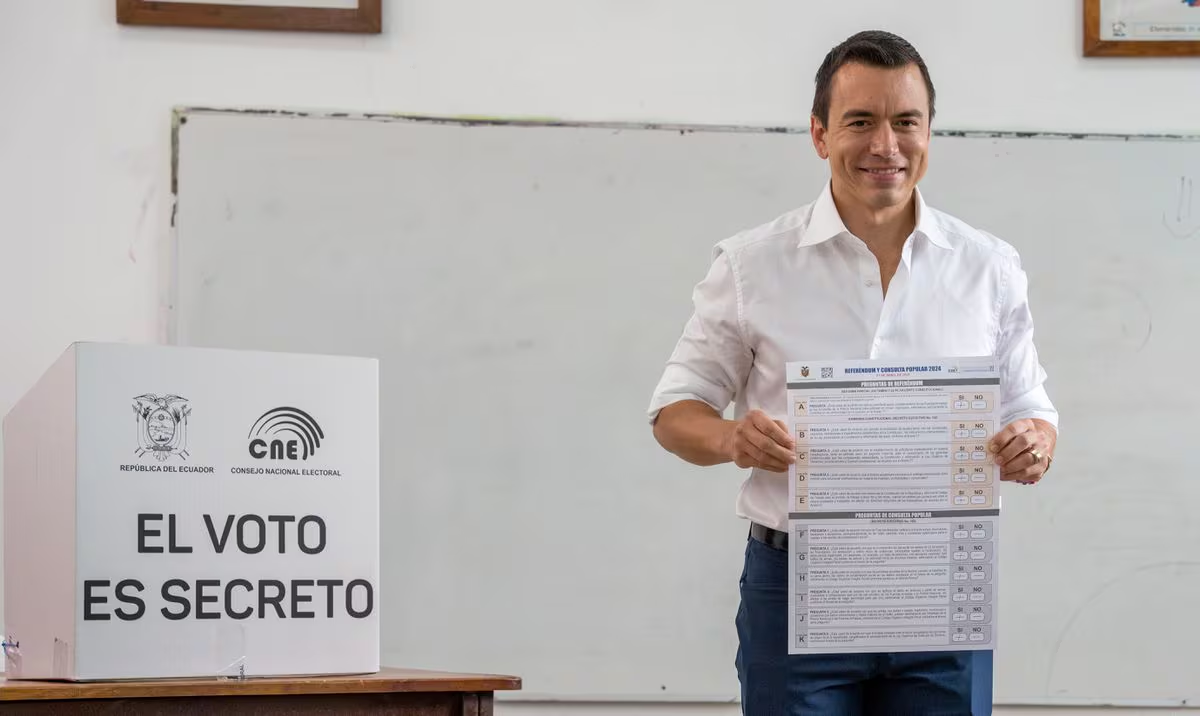The alleged leader of Ecuador’s infamous “Los Lobos” gang was recaptured by authorities on Monday following a months-long investigation launched after the leader fled prison in January.
Three and a Half Months of Freedom:
The gang leader, Fabricio Colon Pico, had escaped a prison in Riobamba on January 9th, where he was held awaiting trial for the kidnapping of an Ecuadorian civilian in 2023 and an alleged plan to assassinate Ecuadorian Attorney General Diana Salazar. Colon Pico escaped the prison alongside 36 other inmates, just one day after another gang leader, Jose “Fito” Macias, escaped from a prison located in Guayaquil.

Following his escape, Colon Pico released a video statement in which he claimed that the gang leader only broke out of prison due to fears regarding his safety. In the statement, Colon Pico offered to surrender himself to authorities if President Daniel Noboa made guarantees to protect his life and ensure he would not be killed in prison.
Noboa shrugged off the offer in an interview with FM Mundo Radio, stating that “this country is already fed up with conditions being set by criminals. Conditions are set by good people; conditions are set by the Ecuadorian family, by the government, by the state; criminals don’t put them in.”
Colon Pico was recaptured alongside four other individuals, two of whom were also escapees, while another was his sister. Authorities were reportedly greeted by Colon Pico and his companions with gunfire. These attempts to resist arrest failed, leading to the arrest of the group along with the seizure of 1 rifle, 2 pistols, 60 ammunition cartridges, and $7,300 in cash.
#URGENTE ||
CAPTURADO #COLÓNPICO
Esta madrugada en #PuertoQuito, #Pichincha, tras labores investigativas y operativas ejecutadas por varios meses por parte de nuestras unidades especializadas de @PoliciaEcuador en coordinación con @MinInteriorEc y @FiscaliaEcuador.
Noticia en… pic.twitter.com/ohJ7MfT3ws
— Policía Ecuador (@PoliciaEcuador) April 22, 2024
Esteban Cobo, the Vice Minister of Ecuador, stated that Colon Pico will likely be sent to Ecuador’s infamous “La Roca” prison in Guayaquil, the same prison where Fito and former Ecuadorian Vice President Jorge Glas have been held.
Continued Operations Against Ecuadorian Gangs:
This arrest follows a recent security-focused referendum organized by Noboa’s government on Sunday, intended to grant the president further power to fight against the various criminal gangs within Ecuador. Between 63 and 70% of voters voted in favor of the security measures, some of which include the authorization of further patrols by military and police units, preventing parole for crimes like kidnapping or terrorism financing, extraditing wanted criminals, establishing longer sentences for violent crimes, tougher gun restrictions in regions nearby prisons, and the authorization of the military to use confiscated weapons.

While Noboa won over voters on the security front, two economic policies were rejected by Ecuadorians. The referendum sought to allow employers to contract workers by the hour alongside a vote to allow international arbitrage; both policies were rejected by over 60% of voters.
This referendum comes after a major shift in Ecuador’s security situation in January, when infamous Los Choneros gang leader Fito Macias escaped prison in Guayaquil, sparking an uprising in Ecuador’s criminal underworld, which would lead President Noboa to declare a national state of emergency. Despite the now-month-long state of emergency, Ecuadorian authorities continue to struggle to put an end to the wave of violence that has plagued that nation while Fito himself remains uncaptured.

While some theorize that the gangs took up arms against the government in response to Noboa’s state of emergency, others believe that the true origin of the conflict lies in the actions of Diana Salazar, the aforementioned Attorney General of Ecuador.
Salazar is often seen as the brain behind a series of investigations into numerous politicians, police officials, and prosecutors who had allegedly worked alongside Ecuador’s gangs for personal gain. This investigation, dubbed “metastasis,” a term used to describe the spread of malignant growth, would surely be responded to with “an escalation of violence” from criminal organizations, according to Salazar.
The investigation began in 2022 following the murder of drug lord Leandro Norero, who was killed while serving time in prison. Investigators searched Norero’s phone, discovering evidence of high-ranking state officials cooperating with Norero while handing out favors in exchange for money, gold, prostitutes, apartments, and other luxuries.

Following her investigation, over 75 raids were launched against those who cooperated with Norero, and dozens of suspects were arrested.
Analysis:
The arrest of a prominent gang leader who had previously managed to evade recapture by authorities demonstrates President Noboa’s continued efforts to put an end to the dire security situation in Ecuador. Furthermore, the recent referendum focused on matters of security, which shows that many Ecuadorians top priority is regaining a sense of safety within the country.
This referendum may also be seen as a way to gauge the current president’s popularity; however, it is important to note that while many of the articles were approved, Noboa’s articles relating to economic matters fell flat, which may imply that the articles passed due to the security situation rather than Noboa’s popularity.


